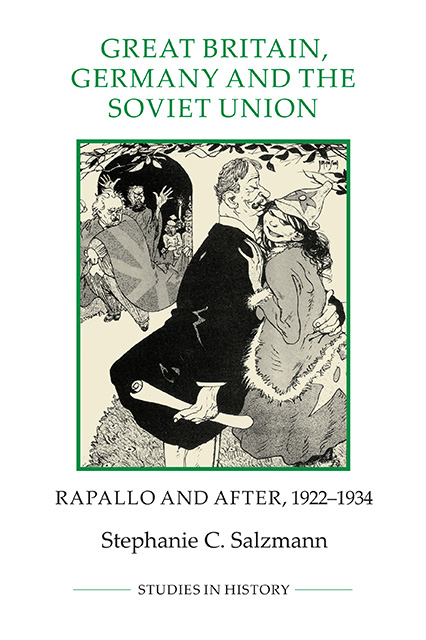Book contents
- Frontmatter
- Contents
- Acknowledgements
- Abbreviations
- Introduction
- 1 ‘It Nearly Overthrew the Applecart’: Lloyd George and the Treaty of Rapallo
- 2 ‘The Most Important Event Since the Armistice’: The Foreign Office and Rapallo
- 3 Rapallo’s First Test: The Ruhr Crisis
- 4 The Policy of Conciliation: Rapallo and the First Labour Government
- 5 The Battle for the German Soul: Locarno and the Treaty of Berlin
- 6 Rapallo and the Rupture of Anglo-Soviet Relations
- 7 Rapallo and the Decline of the Locarno Spirit
- 8 An Economic Rapallo?
- 9 Rapallo and the Disarmament Conference
- 10 The Rapallo Relationship and Hitler’s Rise to Power
- 11 The End of Rapallo: The German–Polish Non-Aggression Treaty
- Conclusion
- Bibliography
- Index
- Frontmatter
- Contents
- Acknowledgements
- Abbreviations
- Introduction
- 1 ‘It Nearly Overthrew the Applecart’: Lloyd George and the Treaty of Rapallo
- 2 ‘The Most Important Event Since the Armistice’: The Foreign Office and Rapallo
- 3 Rapallo’s First Test: The Ruhr Crisis
- 4 The Policy of Conciliation: Rapallo and the First Labour Government
- 5 The Battle for the German Soul: Locarno and the Treaty of Berlin
- 6 Rapallo and the Rupture of Anglo-Soviet Relations
- 7 Rapallo and the Decline of the Locarno Spirit
- 8 An Economic Rapallo?
- 9 Rapallo and the Disarmament Conference
- 10 The Rapallo Relationship and Hitler’s Rise to Power
- 11 The End of Rapallo: The German–Polish Non-Aggression Treaty
- Conclusion
- Bibliography
- Index
Summary
The policing of the Versailles agreement was based on two general concepts which cancelled each other out. The first failed because it was too sweeping, the second, because it was too grudging. The concept of collective security was so general as to prove inapplicable to circumstances most likely to disturb the peace; the informal Franco-English co-operation which replaced it was far too tenuous and ambivalent to resist major German challenges. And before five years had elapsed, the two powers vanquished in the war came together at Rapallo. The growing co-operation between Germany and the Soviet Union was a crucial blow to the Versailles system, something the democracies were too demoralised to grasp immediately.
The treaty, which Germany and Bolshevik Russia concluded in the small Italian seaside resort of Rapallo in the spring of 1922 ranks among the diplomatic coups de surprise of the twentieth century – perhaps only comparable to the big renversement des alliances of the eighteenth century.Up to the present day, the ‘ghost of Rapallo’ has lost little of its original fascination. However, the signing of the treaty received a level of attention, and the agreement itself was attributed a degree of importance that neither the Germans nor the Soviets had intended or expected. Besides the myths and historical re-interpretations, the real historical impact of the treaty of Rapallo lies in its consequences, particularly for the two victorious powers which dominated and largely determined the European order after the FirstWorldWar: Great Britain and France. But the treaty also impacted significantly on the newly created small states in east central Europe.
Agreat deal has been written about the treaty of Rapallo, about its origins and its subsequent history. However, a close look at the literature on European politics during the 1920s and early 1930s reveals a meagre harvest as far as Rapallo’s place in the wider context of international relations is concerned. Also the literature on British foreign policy of the 1920s and early 1930s is somewhat thin. Although a number of studies on British foreign policy have been published in recent years, they usually concentrate on certain aspects of British policy; overviews or works covering a larger period of time are missing. The only recent exceptions are G. H. Bennett’s study, British foreign policy during the Curzon period, 1919–1924, and R. Grayson’s book, Austen Chamberlain and the commitment to Europe which covers the whole Locarno period (1924–9).
- Type
- Chapter
- Information
- Great Britain, Germany and the Soviet UnionRapallo and after, 1922-1934, pp. 1 - 6Publisher: Boydell & BrewerPrint publication year: 2002



